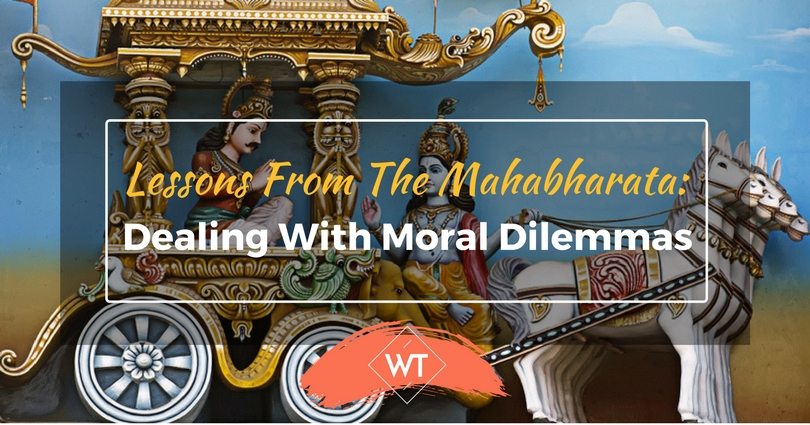An Ethical analysis of the longest epic- Mahabharat

Moral Dilemmas in Mahabhatarat
One of the main concerns of Mahabharata is dharma. It is discussed throughout the text
by various characters in various situations and thus all the prevalent ideas of the time are put
forward and examined. An ethical dilemma arises when a person is committed to two or more
moral obligations and he cannot fulfil one without violating his duty to the other. It presents
irreconcilable alternatives and the choice between them seems to be made irrationally or for
reasons other than moral. The classic and the most well known example is Arjuna’s dilemma at
the beginning of the war which necessitates the Bhagvadgita.
There are other instances. For example in the Karnaparva, Yudhishthir is forced to flee the battlefield after being painfully humiliated and wounded by Karna. Arjuna comes to find out what exactly has happened when Yudhishthira angrily turns upon him and says that he had undertaken the war mainly because of his confidence in Arjuna and his Gandiva bow. The war, however, was dragging on destroying thousands with no end in sight. Arjuna’s boast of being the finest archer in the world was proving to be hollow. Yudhishthira not only insults Arjuna but also the Gandiva. Arjuna now has to choose between killing his elder brother and breaking his vow that he would kill anyone
who insulted the Gandiva. His kshatriya dharma demands that he kill Yudhishthira but Krishna
intervenes arguing that while keeping one’s vows is an integral part of protecting the truth it
cannot be an unconditional or absolute obligation especially when it demands a grossly unjust
and criminal act like patricide or fratricide. In support of his proposition he narrates two stories.
A sage Kaushika had vowed to tell the truth all his life. One day he was sitting near a
crossroad when some travellers ran by trying to escape the bandits who were chasing them. They
requested Kaushika not to reveal to the bandits the direction which they had taken but Kaushika
made no answer. The bandits, knowing that the hermit would not lie, asked him about the
travellers. Kaushika told them the truth. As a result the travellers were killed by the bandits.
Kaushika was condemned to hell because he had chosen his duty to tell the truth above saving
innocent lives. His abiding by his vow was only egoistic and came to nothing because under
certain circumstances lives must be saved even at the cost of truth. This is not to propagate
expediency but to argue that there are times when a lie can become a higher truth than the truth
itself.
Mahabharata is a story which forces decisions where choices have to be made between conflicting
dharmas . This has to be done after great thought, concentration and consideration, Like in another instance, where Gautam orders his son Chirkari to kill his mother as she has transgressed the dharma and leaves for the forests. Chirkari is caught between following his father’s orders as a son or his own duty to protect his mother. He decides to follow the latter arguing that when a husband does not
remain a provider or a protector, he loses the rights of a husband. In the meantime Gautama
realizes his error and rushes back to prevent his orders from being carried out. He blesses his son
for disobeying him and realizes that in worldly affairs it is not right to take decisions in haste or
anger. Dharma moves slowly. It requires patience and often leads to extreme loneliness.
Comments
Post a Comment